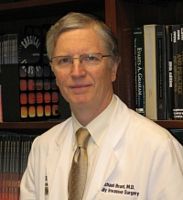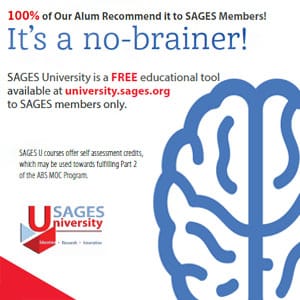Dr. Patricia Sylla, Chair of SAGES CITF Task Force, Profiled in General Surgery News
Dr. Patricia Sylla, Chair of SAGES Conflict of Interest Task Force, is profiled in this month’s issue of General Surgery. Read the full article here.
Message from the President – Summer 2014
It is a tremendous honor and privilege to serve as your SAGES President for the coming year. It was 22 years ago that I became a SAGES member and attended my first SAGES meeting in Washington, DC. The atmosphere at that meeting was electrifying and I will never forget it – it was still in the rapid growth phase of the laparoscopic revolution and it seemed that every week something new was being done laparoscopically. That meeting was also the debut of the Lap Rappers and the precursor to the Friday night main event that has become a signature feature of every SAGES meeting.
Today as I reflect back, it is amazing to see the evolution of our society to an organization that has impacted education and training, research, and innovation in virtually every aspect of GI and endoscopic surgery. Our annual meeting continues to be the centerpiece of our educational activities and we recently had another successful meeting in Salt Lake City with 2000 attendees who experienced a comprehensive program put on by Jeff Marks and Tonia Young-Fadok. Next April 15-18 we will be in Music City in Nashville and Aurora Pryor and Michael Holzman, the Program Chairs for 2015, are planning a fabulous educational meeting.
SAGES now has more than 6300 members, 33 committees, and more than 400 committee members who devote countless hours of work toward making our society and the surgical world a better place. SAGES as much as anything represents opportunity for its members – the opportunity to get involved, to contribute to the work of our various committees and projects, to participate in the annual meeting, and to make a difference in surgical care for our patients.
I’d like to highlight some important initiatives that have been undertaken by our society over the last several years that continue to build and gather momentum. The SAGES Fundamentals portfolio now consists of FLS, FES (Fundamentals of Endoscopic Surgery) and FUSE (Fundamental Use of Surgical Energy). FLS has been taken by more than 5300 general surgery residents over the last 5 years and under the leadership of Steve Schwaitzberg, is exploring international efforts in Latin America, China and other parts of the world. The Flexible Endoscopy curriculum was developed by the American Board of Surgery, in conjunction with SAGES and other GI societies, an effort led by Brian Dunkin. The curriculum has FES (led by Jeff Marks) as the centerpiece, and has now been mandated for general surgery residents graduating in the 2017-2018 academic year along with FES certification. I encourage you to support FES by reviewing the on line web based didactic program and by taking the FES examination; and if you are in a training institution, to integrate the Flexible Endoscopy Curriculum and FES into your surgical training programs. And FUSE, led by Dan Jones, will become available this summer as the first comprehensive educational program to address the topic of surgical energy and safe use of energy devices in the OR.
Enhanced patient safety and improving surgical outcomes are among my top priorities as president. Although it’s been almost 25 years since laparoscopic cholecystectomy transformed the surgical world, we continue to see major bile duct injuries that occur during this most common of procedures. Moreover, the occurrence of a major bile duct injury can be devastating for the patient who otherwise would have undergone an outpatient procedure with prompt return to their normal activities.
At my direction, SAGES has formed the Safety in Cholecystectomy Task Force led by Rob Fanelli and Horacio Asbun with the mission of encouraging a universal culture of safety for cholecystectomy and reducing biliary injuries. The group has distributed a Delphi survey to our committee members in an effort to develop expert consensus on the factors deemed important for the safe performance of cholecystectomy. The results of this survey will guide the task force and bring focus to the project. A subgroup of the task force will hold a retreat in St. Louis this summer to review the Delphi results and further refine the strategic plan for this program with plans to roll out the first phase of this multimodal initiative within a year.
Finally, it is important to be mindful of our humble origins as a society and of our roots in flexible GI endoscopy. To that end, I have asked Tonia Young-Fadok to produce a documentary film on the beginnings of SAGES that we anticipate will premiere at our annual meeting in April. We also plan to highlight other aspects of SAGES incredible history in the coming year as well.
This is a unique and perhaps historic time in medicine with transformative changes taking place in healthcare. We face not only tremendous economic challenges ahead and constraints regarding the costs of the care we deliver, but will also be increasingly be judged and paid according to the quality of our care and the outcomes we achieve. We also live in an increasing regulatory environment that may negatively impact innovation and the development of new technology. SAGES will continue to lead the way as we navigate these challenges and I encourage each of you to stay engaged and communicate to us your thoughts and ideas or concerns. I am convinced that together we can meet the great challenges in GI surgery and medicine in the 21st century.
L. Michael Brunt, MD
SAGES President
SAGES Welcomes New Board of Governors, Officers and President Dr. Michael Brunt

The Society of American Gastrointestinal and Endoscopic Surgeons (SAGES) announced the election of L. Michael Brunt, M.D., as its new president on April 5th as part of the SAGES Annual Meeting. Dr. Brunt is Professor of Surgery, Director of the Minimally Invasive Fellowship Program and Co-Director of the Washington University Institute for Minimally Invasive Surgery. Enhanced patient safety and improving surgical outcomes will be among Dr. Brunt’s top priorities as president. Read the full press release on PRWeb.
Salt Lake City High School Students To Try on Their Surgical Gloves at SAGES Mini Medical School
For any high school student curious to know if she’s got what it takes to make it as a surgeon, the Society of American Gastrointestinal and Endoscopic Surgeons (SAGES) will hold its Mini Medical School Boot Camp and Interactive Experience on Saturday, April 5th, from 7:30am to 2:00 pm at the Salt Lake Palace Convention Center as part of the SAGES annual meeting.
Through the program, high school students from the Salt Lake City area will learn about the field of surgery through lecture and simulation so they can begin to appreciate that being in the operating room is rewarding, important and exciting work. The program includes classroom lectures, tours of the SAGES conference learning center and exhibit hall and culminates with the “Top Gun Interactive Experience” – a power packed hour featuring video games that help decrease errors, to robotic helicopters that allow students to show off their skills.
“With projected physician and surgeon shortages in the future, we hope this timely program will promote early decisions to join the profession,” said Dr. James Butch Rosser, Mini-Med School Session Chair, general surgeon at Florida Hospital Celebration Health. Dr. Rosser, who will open up the session, recently authored the 2012 study “The Effect of Videogame “warm-up” on Performance of Laparoscopic Surgery Tasks,” which demonstrated that subjects who completed a “warm-up” session with video games prior to performing laparoscopic tasks were faster than those who did not. The study augmented prior research suggesting that videogames could serve as a cost-effective training platform when used as a preparatory exercise for minimally invasive surgical procedures.
“The high school years are the perfect time for students to explore their interest in the field and to groom their background,” added Dr. Raymond Price, Mini-Med School Session Co-Chair, Director of Graduate Surgical Education at Intermountain Medical Center and Adjunct Associate Professor at the University of Utah Medical School. “There is no other opportunity quite like the SAGES Mini Medical School that offers such a hands-on experience for those contemplating a future in medicine.”
The program schedule is as follows:
| Time | Program |
| 7:30am | Registration/Check-in |
| 8:00am | Welcome & Program Overview |
| 8:30am | Hands-On Surgical Skill Development – Lab |
| 10:30am | Break |
| 10:45am | Exhibit Time- escorted tours of the Exhibit Hall and Learning Center |
| 12:30am | Lunch |
| 1:00pm | The Interactive Experience – Classroom |
| 2:00pm | Evaluation, Prizes and Closing |
For more information about the SAGES Mini Medical School Boot Camp and Interactive Experience, visit https://www.sages2014.org/program-registration/mini-med-school/.
